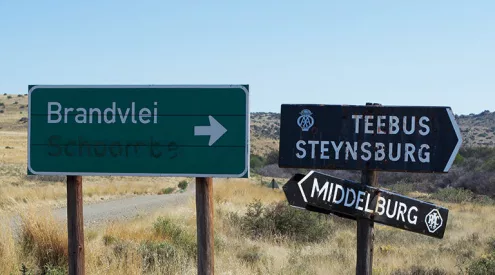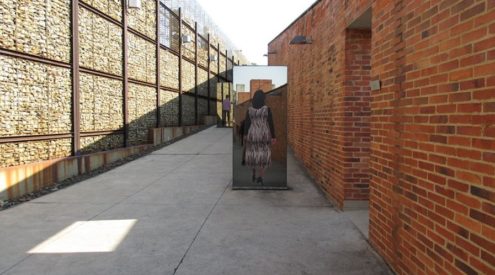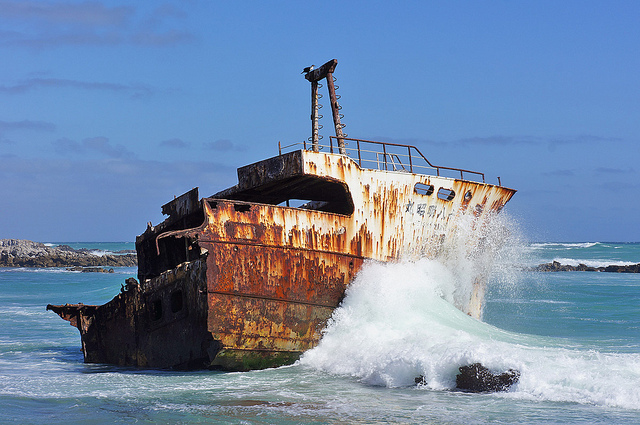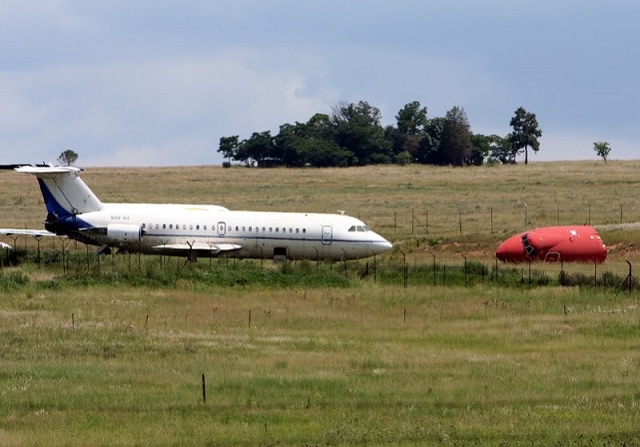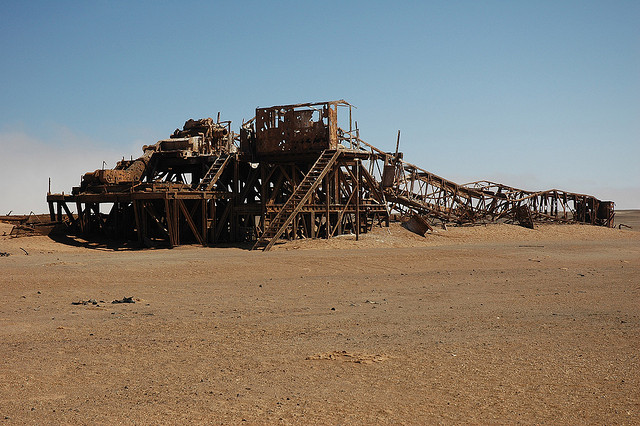10 man-made marvels and abandoned sites in Southern Africa that have been left eerily empty to haunt the landscapes they were left in.
Since the beginning of time, man has devised ways to improve his existence by way of invention. Unfortunately, many of these creations reach their expiry date or meet with a tragedy and are left abandoned and unused, to rot away. The saddest part about it is that we have all encountered at least one of these contemporary artifacts, and never dared to explore them. By doing so, we’re denying ourselves an exciting history lesson, a great adventure, and a gazillion photo opportunities. To encourage you to explore some abandoned sites in Southern Africa, here is a list of places where time is taking its steady toll, and men have long-since lost interest.
1. Eduard Bohlen shipwreck, Skeleton Coast National Park, Namibia
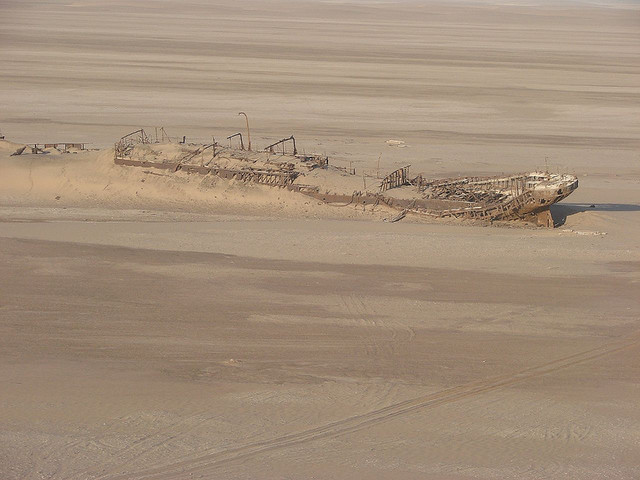
The Eduard Bohlen in the Skeleton Coast symbolises the isolation associated with the Namib Desert.
Image from randomtruth
Deep in the Namib Desert (read: NamibRand Nature Reserve – Namibia’s best-kept secret), is an isolated coastline area known as the Skeleton Coast Park. The two million-hectare desert coastline received its name because of its unquenchable desire to swallow dead metal, animals and sometimes humans. Over the years the Skeleton Coast has developed quite a reputation for swallowing lost trawlers with the most famous being the Eduard Bohlen. The 95-metre vessel was carrying supplies for diamond prospectors from Swakopmund to Table Bay when it ran aground on 5 September 1909. Nowadays, the boat is half buried in desert sand with seal and hyena remains lying inside it. The shipwreck tells the story of loneliness in the desert, and is an oasis for great photographs.
GPS co-ordiantes : 20°38’52”, S 13°34’41″E
Find accommodation on the Skeleton Coast here
2. Ship graveyard, Beira, Mozambique
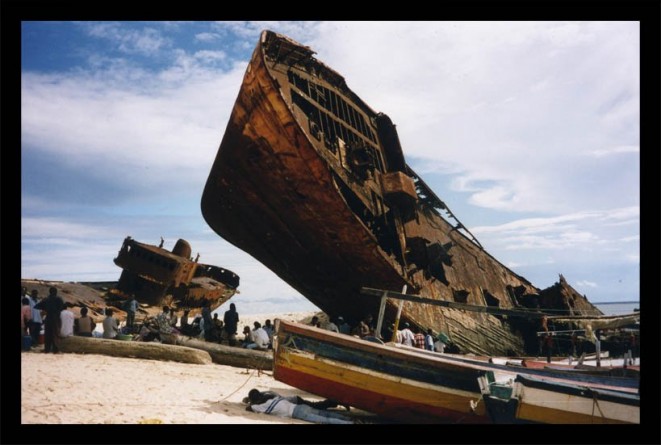
The coastal town of Beira in northern Mozambique has one of the world’s largest ship graveyards.
Image from Henk Oudjin
The 2 500-kilometre coastline of Mozambique has always been an attractive destination for sailors (spend eight days on an Ibo Island and dhow sailing safari in Mozambique). However, it also has a reputation for being a place where ships go to die. Evidence of this is the large ship graveyard in Beira in the northern part part of the country. The coastal town’s shoreline has a collection of shipwrecks dating back to colonial times, making it must-see for history buffs.
GPS Coordinates : S 19.81922°, E 34.90411
Find accommodation in Beira here
3. Diamond Mine Graveyard, Namibia
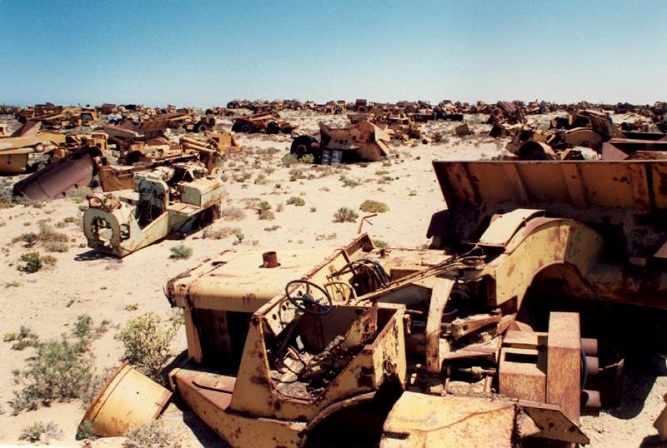
The Consolidated Mine in Oranjemund, Namibia, has the largest earth-moving fleet graveyard in the world.
Photo from sosij
When diamonds were discovered in Oranjemund in 1909, the De Beers diamond mining company was quick to make use of the opportunity. Through the years, the company discarded all the machinery that had been used in the mine. The accumulated metal has created the largest moving fleet vehicle graveyard in the world. The site, now visible from space, is a great place to get acquainted with the diamond mining industry in Namibia and is perfect for photographers.
GPS co-ordiantes : S 20°38’52”, E 13°34’41”
Read: Namibia on a shoestring
4. Meisho Maru shipwreck, Cape Agulhas, South Africa
Image by Damien DutoitLocated on the southernmost tip of Africa, Cape Agulhas has always possessed some sort of mystical charm. Named the Cape of Needles (it’s the place where the Indian and Atantic Oceans meet) the coast has lured many people, including Khoi fishermen and later marine explorers. Unfortunately, it is also located in the Cape of Storms, an area notorious for ship wrecks. Testimony to this is the wreck of Japanese ship Meisho Maru 38 which has been in the shallow water since it ran aground in 1982. With the Cape Aghulas Lighthouse (built in 1848) just a stone’s throw away, the photogenic ship wreck makes for an excellent weekend getaway.
GPS coordinates: 34° 49′ 45.48″, E 20° 0′ 32.04″
Book a stay at Cape Aghulas Guesthouse
5. Smitswinkel Bay, Cape Town, South Africa
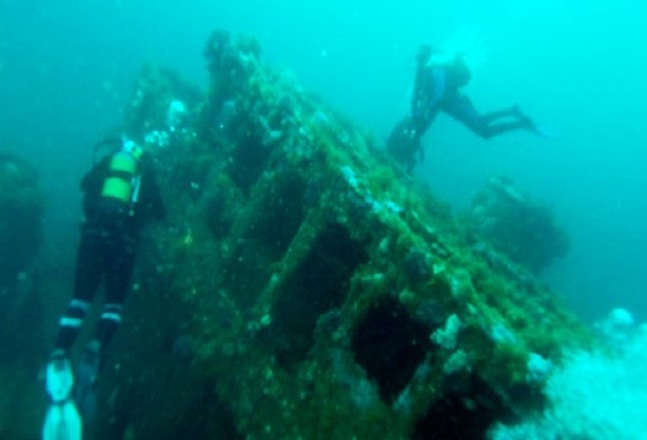
Ship-wreck diving in Smitswinkel Bay is an exciting and eye-opening experience.
Photo by Cape Town Magazine
Underneath the aesthetic ocean in Smitswinkel Bay (one of South Africa’s best deep dive sites) on the Cape Peninsula lies a wealth of shipwreck discoveries. However, to see these wrecks, you have to put on your diving gear and get sub-surface.With five shipwrecks located at a maximum depth of 34 metres and a beautiful beach nearby, Smitswinkel Bay is a great spot to practice your underwater photography.
GPS Coordinates : S 34° 15′ 52.92″, E 18° 28′ 1.2″
Contact Pisces Divers
Tel: 021-782-7205, email [email protected]
6. Kolmanskop, Sperrgebiet National Park, Namibia
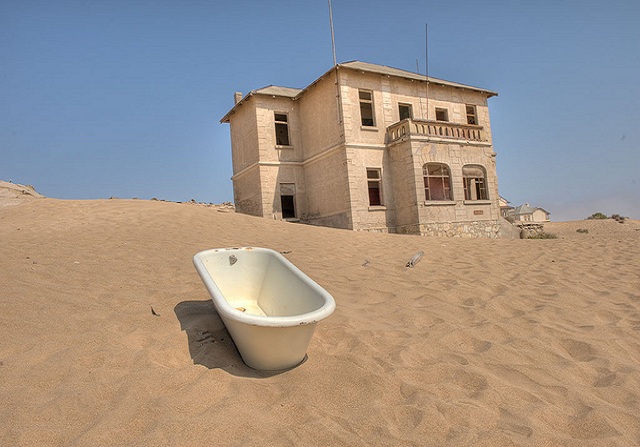
The ghost town of Kolmanskop, Sperrgebiet Namibia.
Photo by gaftels
The ghost town of Kolmanskop was developed in the early 1900s to accommodate prospectors in the sprawling Sperrgebiet diamond mine industry (where to find ghosts in South Africa). Facilities such as a hospital, power station, school, theatre and sports hall were soon built. However, after World War 1, diamond prices crashed and the town could not sustain itself. People soon deserted Kolmanskop for the new diamond town of Oranjemund. A visit to the town is a trip into the haunting story of failed urban development in Namibia’s harshest terrain, the Namib Desert.
GPS coordinates : 26°42?15?, S 15°13?57?E
Take a look at this photographic journey through southern Namibia.
7. Vredehoek Quarry, Cape Town, South Africa
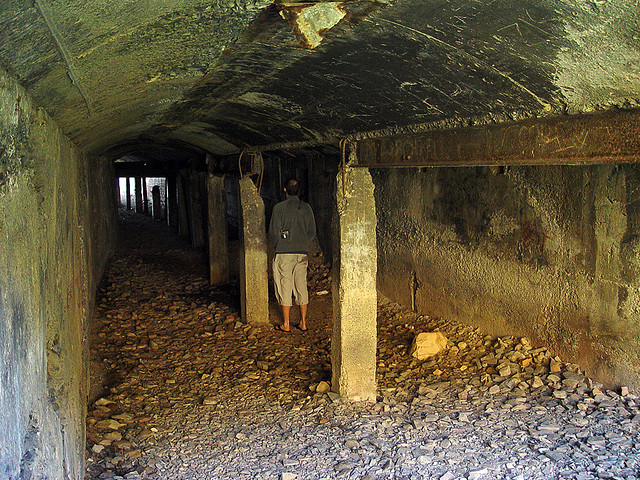
The Vredehoek Quarry near Devil’s Peak is still one of Cape Town’s lesser-known abandoned creations.
Photo by Damien Du Toit
The Vredehoek Quarry near Devil’s Peak is one of Cape Town’s best kept secrets. Located near the old Vredehoek Tin Mine, the quarry can be accessed by using an old tunnel. The quarry does not only offer a trip into undiscovered parts of the Mother City, but is also a great spot for rock climbing and mountain biking.
Find affordable accommodation in Vredehoek here, and while you’re in the area pop into the Deer Park Café for a bit of grub.
8. Pinda Lighthouse, Mozambique

This abandoned lighthouse on the Pinda Peninsula, Mozambique, was built by the Portuguese and is currently open to the public.
Image by Stig Nygaard
In 1923, the Portuguese erected a 31-metre lighthouse in Memba Bay, in the north of Mozambique, to guide ships away from the Pinda Shoals, and steer them towards the port of Memba. 90 years later, the black and white lighthouse which still overlooks the north-eastern coast of the country has been abandoned. However, surrounded by great scenery in the Pinda Peninsula, the isolated lighthouse is a worthy detour en route to the beautiful Wimbe Beach.
9. Aeroplane graveyard, Lanseria Airport, South Africa
Image from avcom
A aeroplane graveyard with aeroplane skeletons scattered all over the place, doesn’t only exist in your wildest imaginations, there’s one in your doorstep. Lanseria Airport in Johannesburg boasts one of the largest airplane graveyards in Southern Africa. Although the area is restricted, a few members of the public are invited every now and then.
GPS coordiantes: S 25° 56′ 22.9, E 27° 55′ 32.1
Find accommodation in Johannesburg here
10. Oil drilling rig, Skeleton Coast National Park, Namibia
Photo by calips96The abandoned oil rig in Skeleton Coast National Park symbolises the struggle of the oil drilling industry in the harsh terrain of Namibia. Built in the 1960’s by ambitious businessmen, the oil drilling rig proved to be an unsuccessful venture and was soon abandoned in the 1970s. Although the oil rig has deteriorated through the years, it still has its main power unit, a V16 Caterpillar engine. For photo opportunities combining the industrial with the barren and uninhabited, this is an an excellent spot to visit.
GPS coordinates : S 20°38’52” S, E 13°34’41”
Main photo by gaftels


